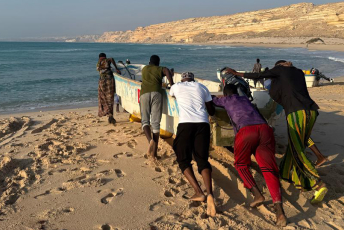Field research by the ENACT programme has exposed how violent criminal networks and corrosive internal corruption became drivers of rhino poaching in South Africa’s Kruger National Park.
ENACT is a European Union-funded programme that investigates and develops responses to transnational organised crime in Africa. It is implemented by the Institute for Security Studies (ISS) in partnership with INTERPOL and the Global Initiative Against Transnational Organised Crime (GI).
South Africa’s rhinos have long been under pressure. White rhino numbers in Kruger fell 75% in the nine years to 2020, while a small population of critically endangered black rhino dropped by more than half.
Estimates vary for how many of Kruger’s staff are involved in poaching, but investigations by auditing firm KPMG and police found evidence of criminal payments to at least 50 park employees. Countermeasures are showing signs of success, with the arrest in 2022 of two rangers and 11 accomplices implicated in poaching, corruption and money laundering.
ENACT’s research in Mpumalanga province and Kruger between October 2022 and January 2023 included anonymous interviews with wildlife, enforcement and security officials, and a review of research, court documents, video footage and civil society reports. It exposed the complex link between corruption, organised crime and poaching, and the reasons people endanger the wildlife they are paid to protect.
More than 2.9 million people live within 50 km of Kruger’s western boundary. The park employs around 2 500 staff and supports an additional 4 500 jobs, but local unemployment runs at more than 45%.
Most staff live near the park, so are vulnerable to coercion and threats from poaching syndicates and criminal gangs living among them. ‘What do you do when you live in communities where the syndicates are so entrenched?’ Kruger Head Ranger Cathy Dreyer told ENACT. ‘I’m not making excuses for them, but many of the rangers who get involved in poaching or corruption have had their families threatened, their livelihoods threatened. And they have nowhere to turn.’
Police corruption has created a law enforcement and governance void, exacerbated by poverty, inequality, political instability and state inertia. Assassinations of political and traditional leaders, a senior police investigator, witnesses, and organised crime figures have added to the climate of fear.
Relations between Kruger staff and management were poisoned by mistrust, aggravated by a militarised ‘war on poaching’ that puts huge physical and psychological pressure on rangers.
Past efforts to control the crisis saw government and conservation organisations invest vast amounts of money and deploy drones, aircraft and technology. But living conditions remained grim for communities near the park, and staff saw few changes to their own lives, prompting a steady decline in morale as the ‘forever war’ against rhino poaching intensified.
‘It’s a conflict that has impacted severely on frontline rangers, lasting longer than many wars in Southern Africa,’ says Julian Rademeyer, GI’s Director for East and Southern Africa and author of the ENACT report.
He points to action taken by Kruger management to identify and remove corrupt staff and review ranger salaries, with a commitment to improve motivation and rebuild trust. ‘There is a climate of change within Kruger, with very dynamic and ethical people working hard to turn things around.’
After widespread media coverage of the research findings, Rademeyer was invited to brief the Parliamentary Portfolio Committee on Forestry, Fisheries and the Environment. Environment Minister Barbara Creecy referred to the ENACT report when she announced in Parliament that cabinet had finally adopted the new National Integrated Strategy to Combat Wildlife Crime.
She said government would focus on improving the wellbeing of Kruger staff so they are less easily lured into the illicit trade, including career development, training, an anonymous tip-off line and creating community liaison committees.
‘The struggle in the Kruger mirrors the wider South Africa,’ says Eric Pelser, Head of the ENACT programme at the ISS. ‘Criminal networks and their corruption of officials are an existential threat to South Africa’s people, democracy, political integrity and economic growth.’
The ENACT study will be repeated in 2024 to monitor progress.
For more information, contact:
Eric Pelser, ISS: [email protected]







